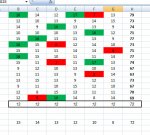Sacrosanct
Legend
He's probably better off having never seen play. At least that way he never got eaten by a grue at first level. What a tragedy that would be.
Knowing my group, it would have been rot grubs.
He's probably better off having never seen play. At least that way he never got eaten by a grue at first level. What a tragedy that would be.
Try rolling stats in order (using whatever system you want: 3d6, 4d6k3, whatever). Now, this is random and gives the player no control. But after rolling six ability scores in order, pick two and swap them over!
Looking at the array you rolled, and mulling over the possibilities, gives you ideas that you cannot get in a system where you had total control from the start.
Point-buy allows you to metaphorically make your PC more stupid so that he is stronger. If you want a PC with high Str and aren't bothered with Int, why would you ever choose to have Str 14 and Int 10 when you could have Str 15 and Int 8, knowing that you have two racial +1 bonuses to assign? Thus, the evolutionary pressure for a population of 16s and 8s, with a dearth of (statistically more common) 10s and 11s.
Using this 'roll in order, swap one pair' method, your wizard might be strong or charismatic or whatever.
I imagine a university for student wizards. Each is likely to have high intelligence or they wouldn't have passed the exam to get in! But can we really say anything about what their other stats would be? Some people are charismatic or strong or what-have-you, and these people are randomly scattered among the population, including that university for wizards! This method much more accurately models that likely student population, because you can make sure that your Int is good enough by swapping a good roll into Int if it isn't good enough already, but four out of five of the others will be random.
But what about that same university using point-buy? What, every single one has Str 8 and Int 16? Really? Have you been to a university? Was every single student on the same course equally weak? Equally un-charismatic?
I had PL (precautionary landing---tech speak for mild crash landing) in the middle of a mine field in Bosnia. We didn't blow up. Seems to me that doing that isn't very risky....
Law of averages man. Using one example to make a statement like this seems pretty odd
This objection would make a lot more sense, if the stat array I posted wasn't a completely ordinary near average result under the suggested method. The average roll I got was a 14.67. That's only a few points above the 14.2 or so (haven't worked out the exact math) that the method produces. Go ahead and try 30 or so cases and see for yourself. There will be a few low outliers with averages around 12 or so, but they'll also be some tremendously high multiple 18's results as well. I mean either 3d6 reroll the 1's or 4d6k3 will tend to produce results near average point buy. You combine the two, and you are no longer doing anything remotely as chancy as landing in a mine field in Bosnia.

Been there; done that. I'd have the t-shirt if they gave out t-shirts for that sort of thing.
You've address some of the issue of control in randomness, but you haven't addressed the fundamental problem that your system is equivalent to the DM assigning different players different amounts of points to spend before play even begins. You've not addressed the problem that in an average group of 6 players, using a method like 4d6k3, you'll have one player with 2 16+'s and nothing below 11, and another player with nothing above 14 and multiple scores below 10. So you've not addressed the fundamental problem that over the long run, the characters that are played tend to be the ones that are above average, and engaging in ever elaborate dice rolling rituals tends to drive that average expectation upwards.
4d6 drop lowest produces almost the same average as array, I don't disagree there. but your "average" isn't.
This is, essentially, my way of handling cases where players really, really want to roll for stats. It can still cause problems, though....I'm 100% certain that anyone rolling stats in my games is perfectly fine with it.
Why? Because they're CHOOSING to do it.
Each player has the option to generate their stats via standard PB limits, standard array, or rolling 4d6 drop one (doesn't HAVE to be the lowest, but I've never seen that happen). Their choice.
IF YOU ROLL:
1) You're doing it at the table in front of the group. We like to witness the rolls & cheer or jeer right along with you. And they get recorded.
2) You're only rolling 1 set of stats.
3) You WILL play the character you generate this way in good faith. After all, you had the opportunity to take a sure thing but chose to leave it to chance....
The part in bold here doesn't follow from the part before it.
